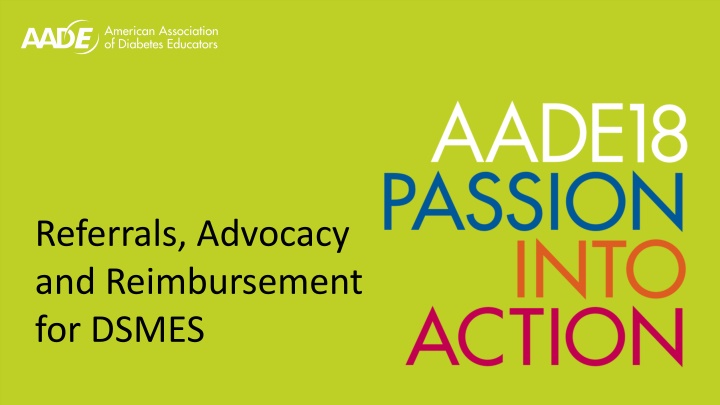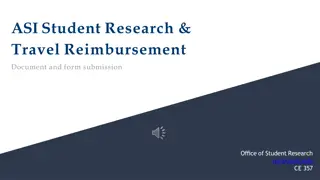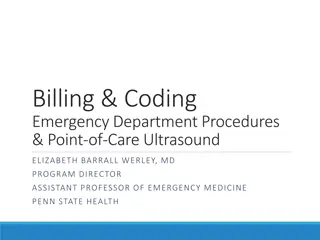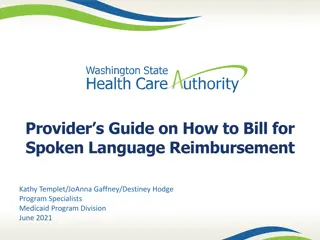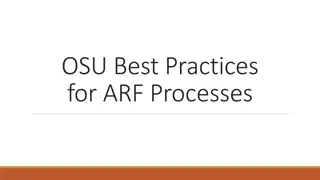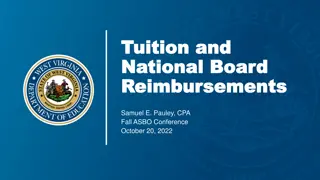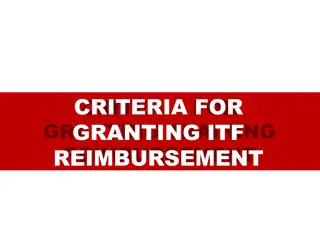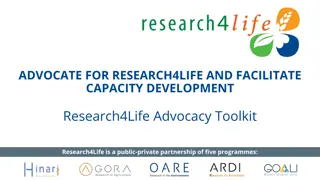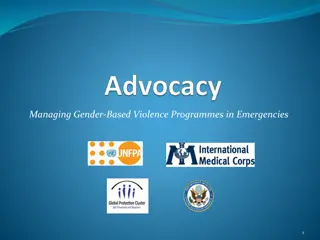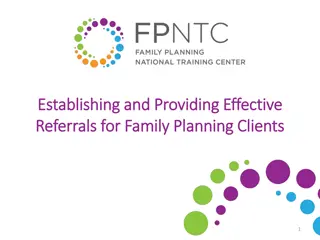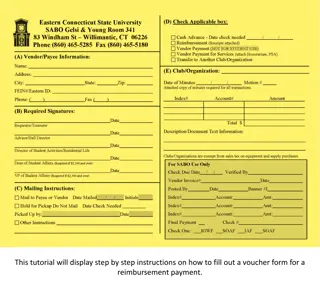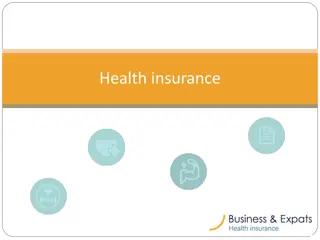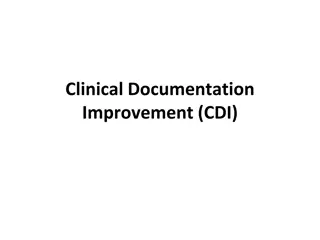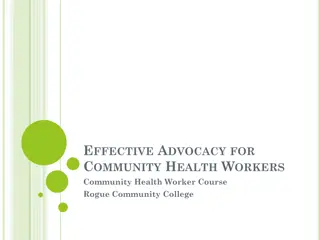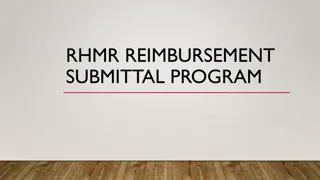Referrals, Advocacy and Reimbursement for DSMES
Explore the critical aspects of referrals, advocacy, and reimbursement for Diabetes Self-Management and Support (DSMES) with insights from Joan Bardsley. Gain knowledge on aligning DSMES with type 2 diabetes care standards, appealing denied Medicare claims, and understanding Medicare policy challenges. Learn about the impact of district court decisions on Medicare coverage and delve into the significance of ongoing patient self-management education in diabetes care.
Download Presentation

Please find below an Image/Link to download the presentation.
The content on the website is provided AS IS for your information and personal use only. It may not be sold, licensed, or shared on other websites without obtaining consent from the author.If you encounter any issues during the download, it is possible that the publisher has removed the file from their server.
You are allowed to download the files provided on this website for personal or commercial use, subject to the condition that they are used lawfully. All files are the property of their respective owners.
The content on the website is provided AS IS for your information and personal use only. It may not be sold, licensed, or shared on other websites without obtaining consent from the author.
E N D
Presentation Transcript
Referrals, Advocacy and Reimbursement for DSMES
Learning Objectives Review the 4 critical times for referral for Diabetes Self Management and Support State how DSMES aligns with the standards of medical care of type 2 DM Explain how to file an appeal for a claim denied by Medicare and what is important to include. Discuss how Medicare policy challenges work and what was tried for CGM coverage. Describe the influence of district court decisions on Medicare coverage.
Joan Bardsley MBA, RN, CDE, FAADE Past President AADE 2014 Chair NCBDE 2018 AVP MedStar Health Research Institute AVP MedStar Corporate Nursing Hyattsville, MD
Disclosure to Participants Notice of Requirements For Successful Completion Please refer to learning goals and objectives Learners must attend the full activity and complete the evaluation in order to claim continuing education credit/hours Conflict of Interest (COI) and Financial Relationship Disclosures: Presenter: Joan Bardsley MBA, RN, CDE, FAADE No COI/Financial Relationship to disclose Non-Endorsement of Products: Accredited status does not imply endorsement by AADE, ANCC, ACPE or CDR of any commercial products displayed in conjunction with this educational activity Off-Label Use: Participants will be notified by speakers to any product used for a purpose other than for which it was approved by the Food and Drug Administration.
Diabetes Self-Management Education (DSME): Component of Standard Diabetes Care Ongoing patient self-management education and support are critical to preventing acute complications and reducing the risk of long-term complications ADA. Standards of Medical Care. Diabetes Care (2017) Powers et al. Joint Position Statement on DSME. Diabetes Care, The Diabetes Educator , Journal of the Academy of Nutrition and Dietetics (2015)
Definitions Diabetes Self-management Education (DSMES) Ongoing process to facilitate the knowledge, skills, and ability necessary for diabetes self-care as well as activities that assist a person in implementing and sustaining the behaviors needed to manage their condition on an ongoing basis Medical Nutrition Therapy (MNT) Application of nutrition care process; includes individualized nutrition assessment, nutrition diagnosis, intervention and monitoring and evaluation; if not included in DSME program, refer to registered dietitian Beck J, Greenwood DA, Blanton L, et al. 2017. National standards for diabetes self-management education and support, Diabetes Educ. 2017 Powers MA et al. DSME/S Position Statement. Diabetes Care, The Diabetes Educator, Journal of the Academy of Nutrition and Dietetics (2015)
Diabetes Self-Management Education: Component of Standard Diabetes Care ADA Standards of Medical Care. Diabetes Care 2016;39(Supp1):52-59
Sorry State of DSMES 1. 5% Of Medicare beneficiaries with newly diagnosed diabetes used DSMT benefit1 2. 6.8% Of individuals with newly diagnosed T2D with private health insurance received DSME/S within 12 months of diagnosis2 6.8% 5% (1) Strawbridge. Health Edu Behav. (2015) (2) Li. MMWR Morb Mortal Wkly Rep. (2014))
Diabetes Self-Management Education Algorithm of Care and Action Steps Position Statement on Diabetes Self-Management Education describes 4 critical times when to assess, adjust and provide DSME and what is included at each time point. Powers MA et al. DSME/S Position Statement. Diabetes Care, The Diabetes Educator, Journal of the Academy of Nutrition and Dietetics (2015) 10
What When 3 1 2 4 Powers MA et al. DSME/S Position Statement. Diabetes Care, The Diabetes Educator, Journal of the Academy of Nutrition and Dietetics (2015)
Evidence for Greatest Impact of DSME Engaging adults with type 2 diabetes in DSME results in statistically significant and clinically meaningful improvements in A1c. The greatest improvements are achieved when DSME: Involves both group and individual education Is provided by a team vs a singe individual Participants attend more than 10 hours Is tailored to the individual participant Is focused on behaviors and engages the participant rather than didactic interventions
Summary There are many evidence-based benefits of DSMES. Of note are the many psychosocial benefits and behavioral improvements DSMES is grossly under utilized The position statement describes the 4 critical times to assess, adjust, provide and refer for education The algorithm checklists provide objective criteria for times when referrals for DSMES are needed Provides clear expectations of the focus areas of DSMES at each of the 4 critical times
But How is this covered by insurance? What is AADE doing to work with regulators to ensure access to this benefit as needed? What can each of us do? The answers
Debbie Parrish BSE, JD Partner Parrish Law Offices Pittsburgh, PA
Disclosure to Participants Notice of Requirements For Successful Completion Please refer to learning goals and objectives Learners must attend the full activity and complete the evaluation in order to claim continuing education credit/hours Conflict of Interest (COI) and Financial Relationship Disclosures: Presenter: Debbie Parrish, BSE, JD No COI/Financial Relationship to disclose Non-Endorsement of Products: Accredited status does not imply endorsement by AADE, ANCC, ACPE or CDR of any commercial products displayed in conjunction with this educational activity Off-Label Use: Participants will be notified by speakers to any product used for a purpose other than for which it was approved by the Food and Drug Administration.
Medicare Beneficiary Advocacy Medicare Administrative Appeals Generally Medicare Administrative Appeals for CGM Medicare Policy Challenges District Court Cases for CGM
Medicare Administrative Appeals Percentage that appeal Levels of appeal Redetermination Reconsideration Admin. Law Judge Council District Court Time for resolution at Admin. Law Judge 1200 v 60
Administrative Appeals and CGM Article stating CGM were precautionary Medicare beneficiaries reaching out to Medicare medical directors Medicare beneficiaries appealing winning Council reversing saying no medical purpose
Medicare Coverage Policies Peer-reviewed literature Consensus of experts Adoption by the relevant medical community
Medicare Policy Challenge Only a Medicare beneficiary can file Need a letter from clinician Discovery and Delivery Judge - invalid under the reasonableness standard Council s technical objection
District Court Cases Wisconsin x 2 - Whitcomb Massachusetts x 2 Lewis, Finigan Vermont - Bloom
Lessons Learned Medicare beneficiary most powerful advocate Medical directors noted the decisions Help each other leverage wins Society statements Medicare Ombudsman The Courts can be helpful but it requires endurance
Leslie E Kolb RN, BSN, MBA Chief Science and Practice Officer American Association of Diabetes Educators Chicago, Il
Disclosure to Participants Notice of Requirements For Successful Completion Please refer to learning goals and objectives Learners must attend the full activity and complete the evaluation in order to claim continuing education credit/hours Conflict of Interest (COI) and Financial Relationship Disclosures: Presenter: Leslie E. Kolb RN, BSN, MBA No COI/Financial Relationship to disclose Non-Endorsement of Products: Accredited status does not imply endorsement by AADE, ANCC, ACPE or CDR of any commercial products displayed in conjunction with this educational activity Off-Label Use: Participants will be notified by speakers to any product used for a purpose other than for which it was approved by the Food and Drug Administration.
Advocacy at AADE Advisory Committee Diabetes Advocacy Alliance Science and Practice Connection
Advocacy Committee - Purpose To ensure the advocacy functions of the organization meet the highest standards and serve both the members needs and the AADE mission. The committee is tasked with ensuring that the advocacy initiatives of AADE align with the mission and policies and advance the profession and quality of patient care
Advocacy Committee - Members Kathy Gold (Chair) Lisa Laird Garth Reynolds Bridget Jennings Manny Hernandez Ann Constance Suzanne Lohnes Rosane Ainscough Lisa Ranes Teresa Martin Courtney Slater Kate Thomas (Director of Advocacy)
Diabetes Advocacy Alliance (DAA) Coalition of 24 members - formed in 2010 Together we work to inform and educate legislators and other policy makers about: The enormous challenges that diabetes and prediabetes pose to US health and prosperity. How legislation and public policy can help change the course of significant growth in the population of people with type 2 diabetes and complications associated with the disease expected in the coming decades.
DAA Regulatory Position Statement Diabetes Self-management Training (DSMT): Reducing Barriers and improving Utilization Policy Recommendations: Extend the initial 10 hours of DSMT covered by Medicare beyond the first year MNT and DSMT on the same day Remove Cost-sharing Broaden referral Providers Clarify HOPD Community based locations
H.R.5768 Expanding Access to DSMT Act of 2018
Science and Practice National Accrediting Organization (NAO) Diabetes Education Accreditation Program (DEAP) Reimbursement !!!
Common Mistakes RN cannot provide DSMT Initial and follow up Individual visit needs medical necessity documentation RD cannot bill for DSMT service if a RN instructs DSMT requires a multi-disciplinary team Pharmacy's cannot bill for DSMT service
Advocating by Collaborating G-Codes went through an RVS Update Committee (RUC) in 2017 RUC multispecialty committee describes resources required to provide physician services which CMS considers in developing Relative Value Units (RVUs) CMS makes final recommendations
2019-Physician Fee Schedule G0108 $57.31 (increase from $54.19) G0109 - $15.86 (increased from $14.71)
So Much More Public Policy Forum Diabetes Action Plan Indiana Competitive Bidding Secret Shopper https://www.diabeteseducator.org/advocacy
